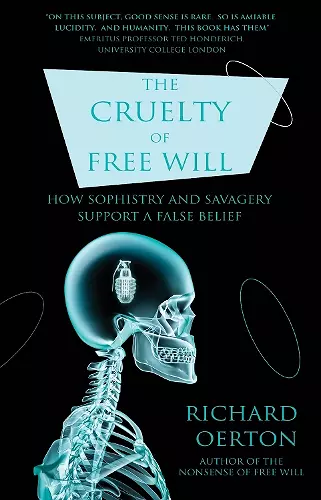The Cruelty of Free Will
How Sophistry and Savagery Support a False Belief
Format:Paperback
Publisher:Troubador Publishing
Published:28th Nov '16
Currently unavailable, and unfortunately no date known when it will be back

Does the idea that we have free will serve to foster our cruelty to one another? Richard Oerton has already dismissed the idea of free will as incoherent and illusory, doing so in The Nonsense of Free Will, a book described as “wonderfully clear – and very clever” by the New York Times bestselling author Sam Harris. The Cruelty of Free Will starts by recapitulating the theme of the earlier book, but then goes on to develop it in important ways. It asks two questions: why – and how – does free will belief persist so stubbornly? Philosophers and others who try to uphold free will are guided less by reason than by their own (probably unconscious) emotions. Blind to the fact that our everyday explanations of human behaviour are based, not on free will, but on an unacknowledged determinism, they try to preserve the idea of free will by means of sophistry and word-play. Their methods include a conjuring trick: that of replacing our common idea of free will with some other concept which, though they call it by the same name, actually involves no freedom of choice. Free will is thought to be a good thing and determinism a bad one, but Richard Oerton insists that we’ve got this the wrong way round because belief in free will fosters ignorance and cruelty. It allows us to think that those whose lives are bleak have only themselves to blame, and that criminals and other bad guys are embodiments of self-created wickedness deserving of retributive punishment – whereas in reality, we are all of us simply the products of biological and environmental luck. The Cruelty of Free Will asserts that human beings belong to what is still a savage species with few inhibitions against harming one another, and that we cling to the idea of free will mainly because it purports to justify the escape and expression of this savagery.
Oerton has done it again: a delightful, wise and compassionate diagnosis of the free will error, and why correcting it matters so much. -- Tom Clark, Director of the Center for Naturalism
The Cruelty of Free Will contains an unpretentious and heart-felt denial of the sort of free will that supports retribution, whether championed by compatibilists, libertarians or illusionists. Oerton's denial of free will places itself squarely in the determinist, materialist and atheist traditions. His denunciation of moral responsibility is so straightforward yet profound that even those who are most strongly committed to this idea may feel impelled to rethink their attachment. Highly recommended for anyone who has ever been tempted to assign ‘just deserts’ - that is, for everyone. -- Richard Double, Emeritus Professor of Philosophy, University of Pennsylvania
On a large subject about which there is common belief, good sense is rare. So is amiable lucidity. And humanity. This book has them. -- Ted Honderich, Grote Professor Emeritus of the Philosophy of Mind and Logic, University College London
Moral responsibility and just deserts promote human dignity, protection of the innocent, equal opportunity, and respect for individual rights: or so both philosophers and “the folk” generally believe. That deep conviction makes it essential to preserve belief in moral responsibility at all costs. Richard Oerton demolishes that belief with wit, insight, and clarity, and this demolition work clears the ground for building a more humane and decent and scientifically sound system. -- Bruce Waller, Professor of Philosophy, Youngstown State University
ISBN: 9781785899928
Dimensions: unknown
Weight: unknown
160 pages